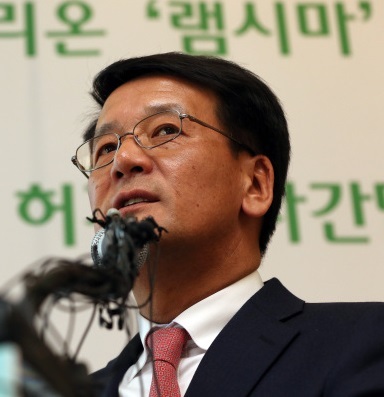The U.S. Food and Drug Administration approved Korean biopharma company Celltrion’s Remicade (infliximab) biosimilar on Wednesday, marking the second entry of a biosimilar drug in the U.S. pharmaceutical market.
The U.S. regulator approved Inflectra, Celltrion’s biosimilar replication of Johnson & Johnson’s blockbuster drug Remicade, for the treatment of rheumatoid arthritis, Crohn’s disease, ulcerative colitis and other conditions.

Celltrion CEO Kim Hyoung-ki speaks during a press conference held Wednesday at the Four Seasons Hotel in central Seoul. (Yonhap)
It is the second biosimilar to be approved in the U.S. after Novartis affiliate Sandoz’s Zarxio (filgrastim), a biosimilar version of Amgen’s white blood cell boosting medication Neupogen.
Biosimilars refer to cheaper, near replicas of complex, biologic drugs which have lost patent protection. Unlike conventional chemical drugs, biologics are based on living cells and proteins, making them more difficult to make as well as impossible to replicate perfectly.
The IMS Institute for Healthcare Informatics predicts that biosimilars will save as much as $110 billion for health systems in Europe and the U.S. by 2020.
Inflectra will likely be commercialized within six months and sold in the U.S. at a price that is 20 to 30 percent cheaper than the original Remicade, Celltrion’s chief executive Kim Hyoung-ki told reporters in Seoul.
The exact pricing will be determined by Celltrion and its U.S. sales and marketing partner Pfizer.
“Inflectra is the first biosimilar monocolonal antibody medication to receive approval in the U.S., as was the case in Europe,” Kim said.
“The approval signifies recognition of Korea’s biopharma technology by the world’s most prestigious health regulator, setting a milestone for Korea’s biopharma sector,” he said.
Celltrion expects Inflectra to channel in some 2 trillion won ($1.7 billion) in annual profits in the U.S., taking away roughly 30 percent of Remicade’s U.S. sales which are estimated at 5.4 trillion won.
Inflectra was approved by the European Medicines Agency in June 2013 under the name Remsima. Since its official launch in Europe two years later, the cheaper drug has been prescribed to some 57,992 patients across the region, as of 2015, taking away some 20 percent of Remicade’s net sales in the region, according to Celltrion.
This year, the Korean drug maker seeks to drive up this number to 40 percent in Europe, Kim said, citing the continued expansion in the use of biosimilars and the accumulation of data that proves the safety and efficacy of its replicated drugs.
Looking ahead, Celltrion has four more biosimilars geared for commercialization, two of which will become the first of their kind to launch in global markets.
Truxima, which references Roche’s lymphatic cancer drug Rituxan (rituximab), was submitted to the EMA for review in October 2015. It is expected for commercialization in Europe in 2017. Celltrion also plans to submit Truxima to the U.S. FDA by the end of this year.
Global pharma giants Amgen, Sandoz and Pfizer are currently developing their own Rituxan biosimilars. All three drugs are undergoing phase III clinical trials as of now.
Celltrion recently concluded phase III clinical trials on Herzuma, which references Roche’s breast cancer drug Herceptin (trastuzumab). Herzuma will be submitted to the EMA for approval by the end of this year and to the U.S. FDA by early 2017.
Herceptin biosimilars made by Amgen, Pfizer and Korea-based Samsung Bioepis are currently in the phase III clinical trial stage.
Celltrion is working on two more biosimilars with aims to submit them for approval in the U.S. and Europe by 2018. One is based on AbbVie’s Humira (adalimumab) and the other on Roche’s Avastin (bevacizumab).
Together, the five biosimilars will pave the way for Celltrion to reach its stated goal of 10 trillion won in global sales by 2026, according to Kim.
As for Samsung Bioepis, another Korean biosimilar developer quickly catching up in the biosimilars development field, the Celltrion CEO expressed hope that “both firms could record high profits in the global market.”
“As the first biosimilar tends to singlehandedly dominate a market in this field, it will be important for Samsung Bioepis to become a first mover in the field,” he said.
With the profits generated by its biosimilars, Celltrion will focus on developing two novel drugs: CT-P27, a new therapeutic antibody for treating universal influenza, and CT-P26, a biobetter that combines antibodies with drug conjugates.
“Celltrion will continue to lead the way for the success of Korea’s biopharmaceutical industry, which can become one of the country’s future growth engines,” Kim said.
By Sohn Ji-young (
jys@heraldcorp.com)



![[KH Explains] No more 'Michael' at Kakao Games](http://res.heraldm.com/phpwas/restmb_idxmake.php?idx=645&simg=/content/image/2024/04/28/20240428050183_0.jpg&u=20240428180321)


